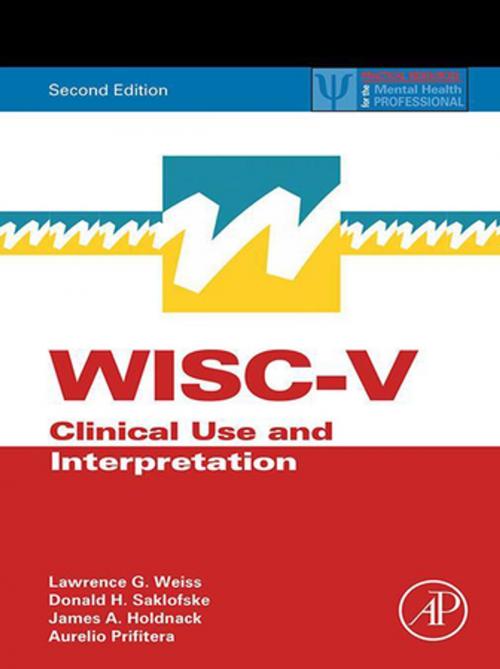WISC-V
Clinical Use and Interpretation
Nonfiction, Reference & Language, Education & Teaching, Educational Theory, Educational Psychology, Health & Well Being, Psychology, Clinical Psychology| Author: | Lawrence G. Weiss, Donald H. Saklofske, James A. Holdnack, Aurelio Prifitera | ISBN: | 9780128157459 |
| Publisher: | Elsevier Science | Publication: | January 22, 2019 |
| Imprint: | Academic Press | Language: | English |
| Author: | Lawrence G. Weiss, Donald H. Saklofske, James A. Holdnack, Aurelio Prifitera |
| ISBN: | 9780128157459 |
| Publisher: | Elsevier Science |
| Publication: | January 22, 2019 |
| Imprint: | Academic Press |
| Language: | English |
WISC-V: Clinical Use and Interpretation, Second Edition provides practical information for clinicians on the selection of subtest measures, along with their proper administration and interpretation. Full Scale IQ is identified as important for predicting relevant behaviors and primary index scores for characterizing the child’s strengths and weaknesses. Classroom indicators of low scores on each of these abilities are identified, with suggested interventions, accommodations and instructional strategies for low scorers. Coverage includes ethnic differences for the Full Scale IQ and each primary index score, along with evidence of the profound influence of parental attitudes and expectations.
Several other societal and contextual factors relevant to understanding racial/ethnic differences are presented. Two chapters review use of the WISC-V for identifying learning disabilities, testing of individuals with dyslexia, and best-practice recommendations to ensure accurate diagnosis and intervention. Concluding chapters describe advances in the Q-interactive system platform allowing administration of the WISC-V on iPads and other tablets, and how clinicians can tailor assessment using select WISC-V subtests and features.
- Authored by the creators of the WISC-V
- Describes the new subtests, revised test structure and test extensions
- Advises clinicians on test selection
- Provides test result interpretation
- Discusses clinical applications of test use
WISC-V: Clinical Use and Interpretation, Second Edition provides practical information for clinicians on the selection of subtest measures, along with their proper administration and interpretation. Full Scale IQ is identified as important for predicting relevant behaviors and primary index scores for characterizing the child’s strengths and weaknesses. Classroom indicators of low scores on each of these abilities are identified, with suggested interventions, accommodations and instructional strategies for low scorers. Coverage includes ethnic differences for the Full Scale IQ and each primary index score, along with evidence of the profound influence of parental attitudes and expectations.
Several other societal and contextual factors relevant to understanding racial/ethnic differences are presented. Two chapters review use of the WISC-V for identifying learning disabilities, testing of individuals with dyslexia, and best-practice recommendations to ensure accurate diagnosis and intervention. Concluding chapters describe advances in the Q-interactive system platform allowing administration of the WISC-V on iPads and other tablets, and how clinicians can tailor assessment using select WISC-V subtests and features.
- Authored by the creators of the WISC-V
- Describes the new subtests, revised test structure and test extensions
- Advises clinicians on test selection
- Provides test result interpretation
- Discusses clinical applications of test use















